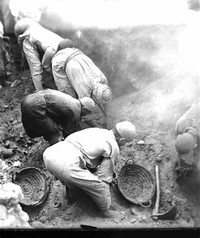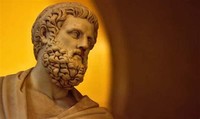Facts about Sophocles

The tragedies of Sophocles are less derivative of Homeric fate or the implacable will of the gods than of inherent human limitations.

Prefiguring Shakepearean tragedy, Sophocles explores human fallibility, the limits of knowledge, and the susceptibility of the human condition within the cosmic order.

Discoveries of papyri from the late nineteenth century onwards, especially at Oxyrhynchus, have greatly added to our knowledge of Sophocles' works.

Throughout the The Theban cycle, Sophocles explores the inadequacy of knowledge, the baffling problem of evil visited on the just, and man's capacity to endure suffering.

Sophocles was born about a mile northwest of Athens in the rural deme (small community) of Colonus Hippius in Attica.

Sophocles won more first prizes (around 20) than any other playwright, and placed second in all others he participated in (Lloyd-Jones 1994, 8).

Among Sophocles' earliest innovations was the addition of a third actor, further reducing the role of the chorus and creating greater opportunity for character development and conflict between characters.

Every major dramatist—from Seneca to William Shakespeare, from Jean-Baptiste Moliиre to Johann Wolfgang von Goethe—has been influenced in some degree by Sophocles' conception of tragedy.

What little is known of Sophocles' life can be gleaned from fragments of other ancient writers, whose works largely have been lost.

Aristotle used Sophocles's Oedipus the King as an example of perfect tragedy, which suggests the high esteem in which his work was held by later Greeks.

Like many ancient Greek names, that of Sophocles (????????) has a meaning.

Sophocles' protagonists were admired by Aristotle as being "like ourselves only nobler."

Ajax, Antigone, and The Trachiniae are generally thought to be among his early works, again based on stylistic elements, with Oedipus the King coming in Sophocles' middle period.

Of Sophocles' more than 120 plays, eighteen won first prize in competitions, although only seven have survived.

Represented by Aeschylus as embittered by his sufferings and betrayal, Philoctetes for Sophocles is far more sympathetic, a figure of warmth and generosity who scorns deceit.

Sophocles' plays Ajax, Electra, The Trachiniae, and Philoctetes were adapted from the Homeric cycle.

Sophocles' play treats the myth of Oedipus, son of King Laius of Thebes and Queen Jocasta, also known as Iocaste.

Young Sophocles won awards in wrestling and music, and was graceful and handsome.
Sophocles of Kolōnos (c. 496 - c. 406 BCE) was one of the most famous and celebrated writers of tragedy plays in ancient Greece and his surviving works, written throughout the 5th century BCE, include such classics as Oedipus the King, Antigone, and Women of Trachis.Sep 29, 2013
Sophocles was an important influence on the development of the drama, most importantly by adding a third actor (and thereby reducing the importance of the Chorus in the presentation of the plot) and by developing his characters to a greater extent than earlier playwrights such as Aeschylus.
Sophocles, (born c. 496 bce, Colonus, near Athens [Greece]—died 406, Athens), with Aeschylus and Euripides, one of classical Athens' three great tragic playwrights. The best known of his 123 dramas is Oedipus the King.Feb 9, 2018


